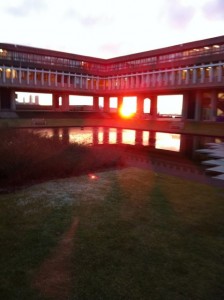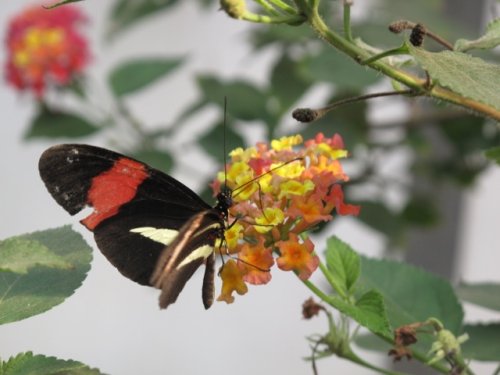Posts Tagged ‘Teaching’
Time May Not Care But I Do
December looms. The last month of the year. I can only wonder how it is that 2013 has just over four weeks to go.
The months have flown by, the year has evaporated. Like the contrails of planes which soar overhead, all that’s left are lingering impressions of passing through space and time. I know I started there and I know I’ve ended up here, but I’ve lost the texture of the days and won’t remember all the details of my experiences along the way.
Time’s not going to hesitate in its relentless march to give me back the days or weeks or minutes or seconds I wasn’t able to enjoy or forgot to savour.
Time doesn’t care, but I do.
Why?
 Because the end of the year means the end of the semester at Simon Fraser University (SFU) and while time may not care that it’s left me breathless with its bruising speed, I do care about having to say goodbye to the students I’ve been working with since the first week in September.
Because the end of the year means the end of the semester at Simon Fraser University (SFU) and while time may not care that it’s left me breathless with its bruising speed, I do care about having to say goodbye to the students I’ve been working with since the first week in September.
There are any number of reasons for me to be ecstatic. Once exams are over and grading is done, I won’t have to contend with the agony of marking. Once the last book has been read and the last office hour held, I may be able to reintroduce balance in my day to day activities. Once the demands have lessened, I might be able to capitalize on a few extra hours of sleep.
I have many reasons to celebrate. But here’s the thing. All of those reasons and more are trumped by this one truth: I treasure working with undergraduates even if they hand in papers late, even if they won’t contribute to a class discussion, even if they haven’t done the reading, even if their writing skills are still in development, and even if they don’t care as much about the course as I do.
Based on concentrated interactions over 12 to 13 weeks, even if it’s just for 50 minutes each week, a connection is established although not with every student and not always successfully. A rapport grows among the members of each tutorial group, a sense of common purpose.
And for me the most rewarding moments are those times during a tutorial session when I can actually see the students thinking. When it seems like they are puzzling over a new idea, a new concept. Of course, they may just be squinting at the clock in anticipation of being released from the torture of sitting in yet another classroom with yet another TA droning on about something or the other. Maybe. But more often than not, I feel they’re giving serious consideration to the material at hand. They are learning and their horizons are expanding.
My time with these students is rapidly coming to an end and I’m incredibly appreciative of the time I’ve been privileged to spend in their company.
It may be brief, it may be over all too soon, but it’s time well-spent.
The Tracks Of Her Tears
I saw the mother of a young man cry last week.
Her tears weren’t tears of grief and loss.
Rather, the tracks of her tears captured a story of love, bewilderment, perseverance, disappointment, faith, despair, relief, pride, and thankfulness.
Why?
Her son had graduated.
Such a pedestrian sound to this accomplishment: her son had graduated.
But it’s only pedestrian because high school graduation has become an expected (minimal) norm in our world.
However, it’s a mistake to assume high school graduation is automatic even in a community such as West Vancouver which boasts a 97% graduation rate.
There’s the perception that all the children in this community will make it, that they all have an easy ride.
Wrong.
It’s a mistake to assume that the glittering mantle of expensive housing, disposable income, and stable family is the reality for each child. It’s wrong to assume they will thrive in our high schools.
That’s why we have ACCESS.
Located at West Vancouver Secondary School, ACCESS
“… is an alternate school program designed to provide an opportunity for students who require this unique setting to complete the requirements for high school graduation.
In addition to the basic academic program, ACCESS also provides students with the following opportunities.
- 10 day Bowron Lakes wilderness experience
- Participate in various local outdoor activities
- Access to community youth services
- Work experience
- Apprenticeship
Admission is through an interview process…”
The ACCESS grad luncheon this past week was an opportunity to recognize the accomplishments of remarkable young people who had done what is expected of many, but which was not a guaranteed outcome for them.
And in a society which increasingly favours conformity and compliance, they did so while holding on to their unique forms of self-expression, their standout personalities, and saying “I’ll do what you ask, but I’m doing it my way”.
That is strength of character, courage, and conviction.
At ACCESS collaboration is a lifeline. There’s a dedicated team of teachers and youth workers who guide these students and who are joined by representatives from community partners such as the District of West Vancouver Community Services, the West Vancouver Police Department, Vancouver Coastal Health, the Ambleside Youth Centre, and local businesses.
In hindsight, maybe the tears of that young man’s mother did denote loss of a kind. They reflected the grief she’s carried with her knowing her son’s journey has been immeasurably tougher than many of his peers.
But there was more in her eyes.
There was joy. Despite the obstacles, her son had reached this milestone and was publicly recognized for doing so.
There was hope. Hope that it was, after all, going to be fine.
What more could I ask for than to be associated with a system which provides joy and hope to those who are at risk and vulnerable?
A system that is not taken in by the appearance of the community’s “perfection”, but which understands that unless our “diamonds in the rough” have a place to call their own, then our claims of excellence will ring hollow.
Connections? Priceless
In today’s opening essay for Q, the CBC radio show, host Jian Ghomeshi remembered Roger Ebert and the interview he conducted with the famed film critic a year ago.
Jian described how concerned he’d felt about his ability to connect with Mr. Ebert in the studio given the latter’s health challenges. “I needn’t have,” he said.
His words this morning paid tribute to the man, but they also served as a testament to the power of connection.
Listening to Jian made me reflect on my own feelings now that the spring term at SFU is drawing to a close. I’m not completely disentangled from my teaching obligations yet: I’m expecting final essays from my students next week.
But there are no further lectures for the course and no remaining tutorials. And that makes me wistful.
Why?
Because the end of the term represents a loss. The connections I’ve forged with my students after thirteen weeks of working together are now tenuous if not severed. I may have gained back time for my own work and my other commitments, but I am no longer a part of these particular journeys, the unfolding lives of these particular individuals.
Since my first stint as a TA, I’ve connected with approximately 120 students. 120 students from a variety of faculties and departments, given the way course requirements are structured at SFU, and 120 students who represent the gamut of undergraduate experience.
Aside from the occasional encounter on campus, I don’t know where they are now or what they are doing or how they are faring.
When I walk around the Burnaby campus now, a movie reel of sorts plays out in my mind: momentary flashes of memories, frames filled with faces, snippets of conversations, disappointments, and noted accomplishments.
The characters of my movies are students: those with strong opinions, those with a sense of humour, those who struggled, those who exceeded their own expectations, and those who were observers yet offered so much when they found the courage to voice their opinions.
The plot revolves around classic texts of Western civilization and delving for insights into the human condition, then and now. Work on writing, developing critical thinking skills, and trying my best to impart the importance of questioning.
A few students have reconnected via LinkedIn and others lurk on Twitter, but these electronic tentacles, in my mind, pale in comparison to the strength of the collective experience of an in-person weekly seminar or a personal visit during office hours.
My experience at SFU has strengthened my belief that the most critical factor in teaching and learning is the personal aspect. Technology may carry us forward into a brave new world where the nature of human interaction is fundamentally altered forever, and learning is transformed into something which I am not yet able to imagine, but for now it remains as it always has been.
The value of educational experiences rests predominantly, as it does for radio interviews, on human connections.
Expectations
There are essays to mark yet and a final exam to invigilate, but as of today I’ve wrapped up my second term as a Teaching Assistant (TA) in the Department of Humanities at Simon Fraser University (SFU).
Here are some key insights I’ve gained through this experience:
- I enjoy teaching at the post-secondary undergraduate level.
- I love the Humanities.
- I feel a special affinity to SFU and particularly the Burnaby campus.
My enjoyment has come from the interaction with students in an environment which encourages discussion. And there have been many ideas to discuss! Our texts this term ranged from the Greek tragedy Antigone by Sophocles to Plato’s Apology to the medieval French chanson de geste, The Song of Roland, to The Prince by Machiavelli, to the slave narratives by Frederick Douglass and Harriet Jacobs and the contemporary play Copenhagen by Michael Frayn.
This literary selection speaks to me of the breadth of the human experience, the vast scope of history, and the value of the big picture. It’s also about connection from one era to the next, from the people of yesterday to those we share the world with today. Machiavelli, for example, talks about political power and while our context is radically different from 16th century Italy, when we try to understand recent Canadian political scandals such as the Robocall affair or the F-35 fiasco, are we not considering some of the very same principles he explored in his writing?

It may be depressing to think that with all of humanity’s progress, human beings and human nature seem to remain stubbornly the same. Perhaps, on the other hand, there is reason to be optimistic since the study of texts such as these validate and reaffirm our human existence. We have a place in this world and we have the ability to expand and enhance our understanding of who we are. Study in this area helps us see the connection to where we’ve come from and perhaps will help us carve out a better path to where we hope to be.
Here’s something else I’ve decided based on my experience at the university. Education in K to 12 is due for an overhaul. We see this “renaissance” starting in the inquiry-based pedagogical approach that is taking hold and in the support initiatives which recognize the needs of the whole child such as self-regulation. But systematic change is needed.
And we need to make sure that students know how to ask questions and establish their own expectations around their learning experiences.
Why?
Each term, I’ve started off my tutorials asking students to identify the expectations and the concerns they have regarding the course. While they seem to have no difficulty in listing their concerns — the amount of reading, the writing load, marks, and so forth — they seem unable to verbalize their expectations.
Is this perhaps because the system has always told them what to expect and what their learning outcomes ought to be? Have we failed to inculcate our students with the ability to independently identify what the purpose of learning is or what their optimal learning experience may look like?
It seems to me that at the very least an undergraduate should be able to say, “I expect to learn.”
And if I can play a part in that learning, then I think, after years of searching, I may just have found my life’s passion.
